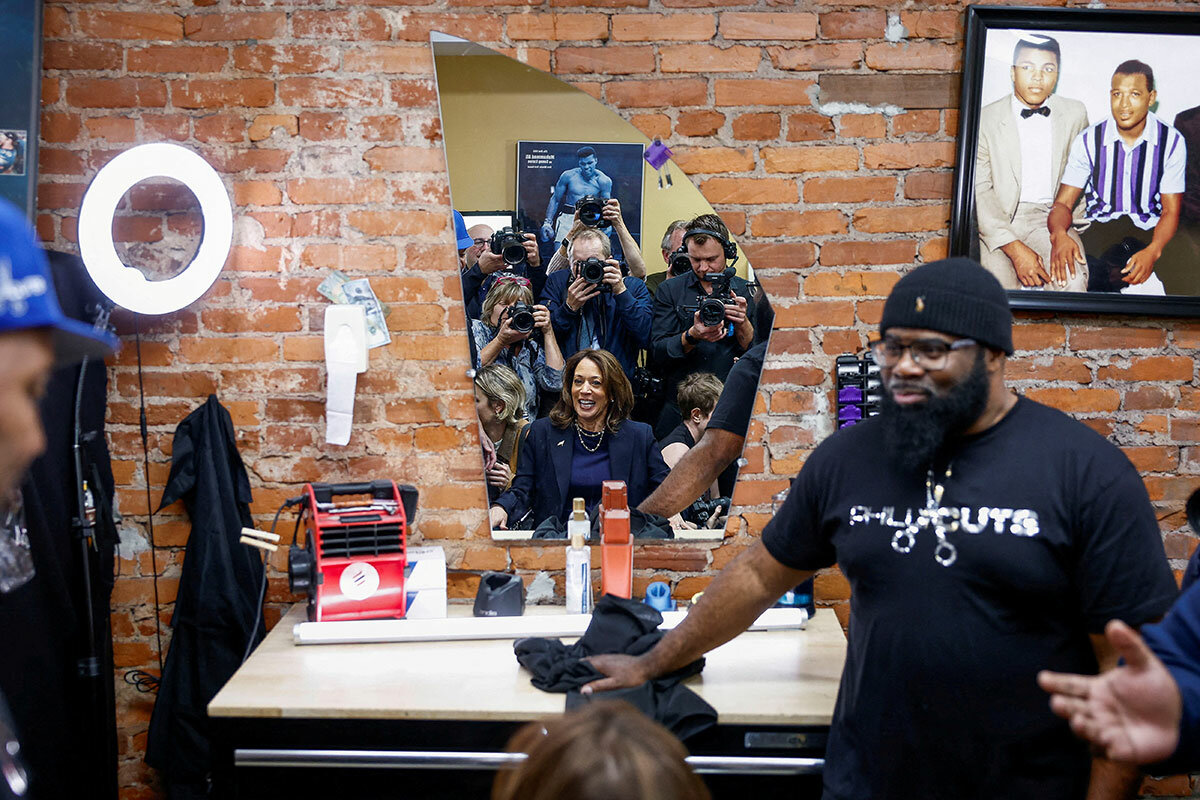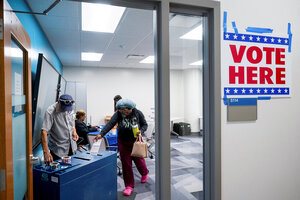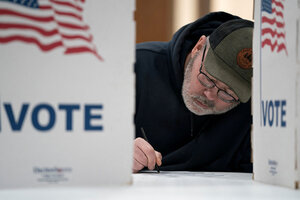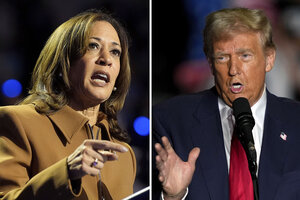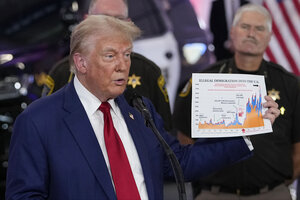The economy has improved. Here’s why it’s still a top issue in crucial Pennsylvania.
Loading...
| Bethlehem, Pa.
As an independent voter living in a battleground state, Elizabeth Brown has mixed feelings about former President Donald Trump.
She’s not crazy about his proposed tariffs, or the tone of his rhetoric, she says. But when he was in office, her salary as a sales manager stretched further – she paid less for her apartment in Bethlehem and could put more meat in her grocery cart. And she hasn’t been able to discern how Vice President Kamala Harris would be any different from President Joe Biden.
Under Mr. Trump, “the economy was good. We didn’t have this situation on the border,” Ms. Brown says. Next week, she’s leaning toward casting her vote for him.
Why We Wrote This
Perceptions of the economy loom large as the Harris and Trump campaigns compete for every last vote in Pennsylvania. Part of a series on the issues that may tip key swing states: Arizona, Georgia, Michigan, Nevada, North Carolina, and Wisconsin.
For much of the past year, Mr. Trump led Mr. Biden by wide margins on the question of which candidate voters trusted more to handle the economy. Since Ms. Harris became the Democratic nominee this summer, however, she has closed that gap in most national polls, as economic indicators have grown increasingly rosy.
Recent data has underscored the strength of the U.S. economic recovery: low unemployment, rising wages for most workers, and GDP growth that outpaces other major economies. Inflation, which peaked at 9.1% in 2022, has fallen to 2.4%, and interest rates have come down, making mortgages more affordable.
Yet many voters say they’re not feeling it – and polls show the economy remains a top concern in Pennsylvania and other battleground states. One reason is that economic growth hasn’t translated into easy living for many middle-class Americans, who blame politicians in Washington for the still-high cost of groceries, gas, and other necessities.
Nostalgia for the pre-pandemic Trump economy is palpable in Pennsylvania’s Lehigh Valley, a hub of manufacturing and logistics a few hours west of New York City and New Jersey. Despite the row of decommissioned blast furnaces looming over Bethlehem, where steelmaking once employed tens of thousands of workers, this is no hollowed-out Rust Belt community. Job growth in health care and education, and proximity to major cities, has attracted newcomers, boosted employment, and raised household incomes in the bi-county region.
Factories are hiring unskilled workers starting at $20 an hour, says Don Cunningham, president of the Lehigh Valley Economic Development Corp. and a former mayor of Bethlehem. And unlike in previous eras, other job opportunities abound. “My old man worked in the steel mills. For the dollar he made in the mills, he couldn’t go anywhere else even if he hated his job,” he says.
Still, frustration over the increased cost of living runs deep here, even as wages are rising. This is what voters usually mean when they say their top priority for picking a president is the economy, says Christopher Borick, a political science professor and director of the Institute of Public Opinion at Muhlenberg College in Allentown. “Inflation is the lens by which those evaluations are ultimately made,” he says.
Mr. Trump held a rally in Allentown on Tuesday, a sign of the region’s importance in the waning days of the campaign. When he asked the crowd if they were better off than they were four years ago, many yelled “No!”
This has created a quandary for Ms. Harris, who is campaigning as a next-generation changemaker, while serving as vice president at a time when a majority of voters say the country is on the wrong track. Should she try to take credit for an economic recovery that is the envy of other industrialized nations? Or disavow its uneven distribution among a disgruntled electorate?
She has promised to “turn the page,” while struggling to explain what exactly she would do, or would have done, differently from Mr. Biden.
“Harris has aligned herself with Biden,” says Ms. Brown, the independent voter. “We don’t know what she would do as president because she’s not explained it well.”
Swing region in a swing state
Northampton and Lehigh counties together make up the Lehigh Valley, named for the river that bisects the region. While Lehigh County (population: 378,000) is anchored by Allentown, the third-largest city in Pennsylvania, and is reliably Democratic, Northampton (population: 313,000) is a swing county that voted twice for Barack Obama, then for Mr. Trump in 2016, and for Mr. Biden in 2020. It has backed the winning candidate in all but three presidential elections over the past century.
Both parties have mounted expansive and expensive efforts to reach voters in Northampton’s midsize cities, suburban townships, and rural communities, which distill the demographics of a typical Northeastern U.S. state – increasingly diverse, plugged into global markets, economically unequal – into a single geographical area.
“Northampton County is probably the best bellwether county in the state,” says Charlie Dent, who represented the Lehigh Valley in Congress from 2005 to 2018. “Whichever [presidential] candidate wins there I believe is going to win Pennsylvania – and the presidency.”
Polls show the two presidential candidates are effectively tied in Pennsylvania, which has 19 electoral votes, the most of any swing state. Mr. Trump won the state in 2016 by fewer than 45,000 votes; Mr. Biden flipped it in 2020 by running up the tally in cities and suburbs.
Victory in Northampton may hinge on whether undecided voters see Ms. Harris as a safe choice to shepherd the economy, says Mr. Dent, a moderate Republican who broke with his party and endorsed Mr. Biden in 2020. “I suspect many are saying, ‘Hey, maybe I was doing a little better under Trump,’ but they don’t like Trump very much because they don’t like his behavior.”
Mr. Dent has already cast an early vote for Ms. Harris, joining a swell of former GOP officials in Pennsylvania and other states trying to defeat Mr. Trump. “She and I will not agree on every issue, but in her, we have a capable leader who will always put the interests of our country before her own, unlike her opponent who will always put his personal interests ahead of those of the United States,” he said in a statement.
In recent weeks, the Harris campaign has sharpened its focus on wooing disaffected Republicans and right-leaning independents in swing states. But it also needs to turn out irregular voters in cities like Bethlehem and Allentown by convincing them that inflation is in the rearview mirror and focusing on what a Harris presidency could achieve.
Benefits versus tax cuts
Ms. Harris has offered a raft of policy ideas on housing, taxation, and child care benefits. Mr. Trump has proposed tax cuts on tipped wages and Social Security benefits, while promising across-the-board tariffs on imported goods. He also favors reducing regulations and taxes on corporations, as he did in his first term when he signed the Tax Cuts and Jobs Act in 2017.
Economists have warned that Mr. Trump’s tariffs and other fiscal policies would create more inflation and bigger deficits than Ms. Harris’ plans.
Amid this debate over future tax-and-spending plans, Mr. Trump’s core argument is mostly backward-looking: The economy was better when he was in charge, he has said repeatedly during the campaign. “We had the greatest economy in the history of our country,” he told a Fox News town hall on Oct. 16. (In reality, economic growth was middling under his watch, while global inflation was low.)
At a diner in Allentown, Richard Kromer is collecting prizes for a Veterans of Foreign Wars raffle. An Army veteran, he later worked at a zinc processor in Tennessee, before retiring in 2021 and moving back to Pennsylvania to take care of his father. He likes Mr. Trump but has major misgivings about his policy on Ukraine, which Mr. Kromer wants the U.S. to support.
On the economy, though, he’s not conflicted. Mr. Trump “had a very strong economy until COVID hit,” he says, ticking off his disagreements with Ms. Harris. “All she has done is put up prices. She doesn’t understand how inflation works.”
Other voters are more approving of the administration’s economic stewardship and more wary of Mr. Trump’s self-justifications and threats to imprison his foes. “It’s all about him and what he wants,” says Roger Aris, a retired restaurant owner in Bethlehem. Ms. Harris has to be loyal to President Biden, he says, but once in office he believes she would put her own stamp on fiscal policy.
“Instead of giving tax breaks to millionaires or billionaires, she wants to help poorer people,” he says.
Mr. Aris, who is 74, was born in Haiti and worked for decades in New York City before moving to Bethlehem. He has four children and 11 grandchildren and great grandchildren. His children, however, don’t all share his enthusiasm for Ms. Harris. Jacqueline Aris, who lives in Bethlehem with her four children, says the economy was better under Mr. Trump. She’s not planning to vote at all this time. “Whichever party wins, we’re all screwed,” she says.
Her friend, Stacie Miller, who works in human resources, says she will vote for Ms. Harris because she wants a woman in the White House. But she’s also feeling economically pinched, unable to afford a bigger house for her family. “The bills keep coming, and I don’t want to pay them,” she says.
One Democrat’s appeal in a tight House race
“V is for voting, to make your voice heard,” says Susan Wild, holding a picture book up for 12 fidgeting preschoolers sitting on an alphabet-themed rug. She smiles at the group assembled inside a brightly lit classroom and turns the page to the next letter.
In 2018, Ms. Wild, a Democrat, was elected to Mr. Dent’s former House seat, and is now locked in a tight race, one of two in Pennsylvania that could help decide control of the U.S. House. She’s running against Ryan Mackenzie, a GOP state representative from the region who has run for Congress in two other cycles. (His campaign didn’t respond to repeated requests for comment.)
Today, Rep. Wild is touring a child care center in Easton that has branches across her district; her own children, now adults, attended one, she tells the staff. Last year, she sponsored the Child Care for Working Families Act, which would cap child care expenditures at 7% of a family’s income and make it free to low-income families. She says passing that bill, which has also been introduced in the Senate, would be her priority if reelected.
“What I’m hearing from people is that their child care expenses rank right up there with their rent or mortgage,” she says in an interview.
But she also highlights low gas prices and wages that are finally growing faster than inflation. She tells voters Mr. Biden’s policies are working and that control of the House would make it possible for Democrats to do even more.
Still, she concedes that the feel-good factor isn’t quite there yet. “When people find that they’re earning more, they want to feel it. They want to feel like they’ve got the ability to buy a luxury item or go on vacation. If it’s just assisting you in getting by, you don’t feel like you’re really making more,” she says.
For those who don’t own a home, the cost of rent is a constant gripe. But it predates the pandemic and has partly been driven by newcomers from nearby states seeking cheaper housing. What has changed in recent years, and is keeping demand high, is growth in local employment, says Mr. Cunningham.
Coattail effects?
Even if Mr. Trump flips Northampton County, ticket splitters may reelect Rep. Wild, who has outraised her opponent and blanketed local airwaves with attack ads. Pennsylvania also has a Senate seat in the balance, with Sen. Bob Casey, the Democratic incumbent, holding a narrow polling lead over David McCormick, the Republican nominee. Both campaigns have each spent more than $100 million to elect their candidate.
Glenn Geissinger, chair of the Republican Party in Northampton County, says he’s confident that downballot Republicans will get a boost from the coattails of the presidential nominee, unlike in 2016 when Mr. Trump won over irregular voters who didn’t necessarily vote the entire GOP ticket.
In 2016, “I think people were going in and saying, I’m going to vote for Donald Trump [only],” he says. “The average American who is voting for Donald Trump now says, I need control of the Senate, I need control of the House, so that the policies that he wants to pass can be instituted.”
At a car wash in Easton, Chris Ozoemena is waiting for his Hyundai sedan before driving back to his shift as a line manager at a medical manufacturing plant. His family of four is “getting by,” he says, though he’d like to see lower food prices. But he doesn’t put much stock in the promises of any of the presidential candidates.
He’s also sympathetic to Mr. Biden, calling him an honorable man who was unceremoniously pushed aside by his party. To Mr. Ozoemena, leadership sometimes means making incremental progress – and being humble enough to admit it. “You’re not going to make America perfect. Just do your bit for four or eight years,” he says.
This is part of a seven-part series on key swing states in the U.S. presidential election and the issues that may tip them. The full series includes articles reported from Arizona, Georgia, Michigan, Nevada, North Carolina, Pennsylvania, and Wisconsin.








